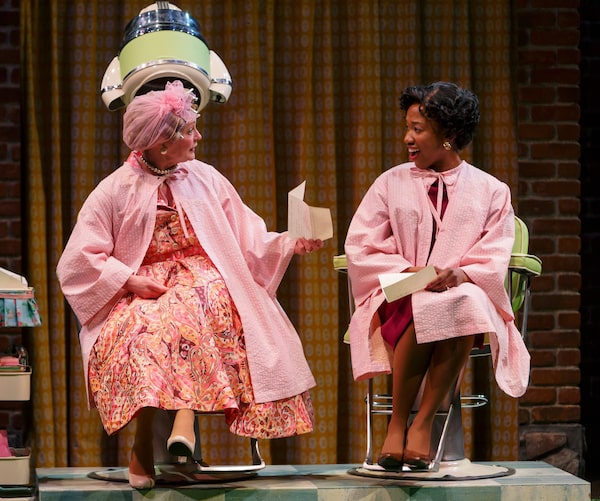
Brigit Wilson (left) as Mrs. Page and Sophia Walker as Mrs. Ford in The Merry Wives of Windsor.David Hou/handout
- Title: The Merry Wives of Windsor
- Written by: William Shakespeare
- Director: Antoni Cimolino
- Actors: Geraint Wyn Davies, Sophia Walker, Graham Abbey
- Company: Stratford Festival
- Venue: Festival Theatre
- City: Stratford, Ont.
- Year: Runs to Oct. 26
The way artistic director Antoni Cimolino places plays and performances in conversation with each other is one of the pleasures only discovered by a proper retreat to the Stratford Festival, rather than just visiting Stratford, Ont., for a single show.
On the first night of the repertory theatre’s opening week, I watched company member Michael Blake trod the thrust stage of the Festival Theatre as that most horribly jealous of Shakespearean characters, Othello.
Then, five nights later, on the same stage, I got to see Blake play Mr. Page, the most trusting husband in the canon, in The Merry Wives of Windsor.
The juxtaposition led me to the surprising conclusion that the latter, less-performed Shakespeare is a much wiser, less romanticized show about jealousy or what Iago calls the “green-eyed monster.”
Stratford and Shaw festivals 2019 guide: What to see and where to eat and drink
In the play, Meg Page (Brigit Wilson) and Alice Ford (Sophia Walker) – the wives of the title – come up with a series of merry pranks to play on the “fat knight” Falstaff (Geraint Wyn Davies), a piece of popular intellectual property that Shakespeare shamelessly repurposed from his Henry IV history plays.
Falstaff, in need of money, has sent both well-to-do women love letters, believing they might open up their purses along with their beds to him.
The would-be gigolo’s two-pronged attack is a rookie mistake: Mistress Page and Mistress Ford are close friends who quickly showed their letters to one another.
They plot revenge underneath hair dryers at a 1950s salon in this production directed by Cimolino, who set the play in that decade and a in small Stratford-esque town in Ontario; this allows designer Julie Fox to parade poodle skirts and hula hoops and yo-yos across her gorgeous, Astroturfed set.
Meanwhile, at the town barbershop, Mr. Page and Mr. Ford (Graham Abbey) are alerted to Falstaff’s plans and have opposite reactions.
Blake’s amiable Mr. Page simply laughs: “If [Falstaff] should intend this voyage towards my wife, I would turn her lose to him; and what he gets more of her than sharp words, let it lie on my head.”
But the seed of jealousy has been planted in Mr. Ford’s head: “A man may be too confident."
There’s nothing subtle about Abbey’s performance as Mr Ford: In his attempt to catch his wife in the act, he dons ridiculous disguises, repeatedly tears apart his house in search of hidden suitors and literally jumps up and down making a fool of himself. This is the green-eyed monster in the form of Fred Flintstone.
But the appeal of Cimolino’s crass but kind-hearted production isn’t in its subtlety. The director leans heavily into the jokes about Falstaff’s figure, calling upon Wyn Davies, generously padded, to execute shameless physical comedy routines such as rocking back and forth on his back like an overturned turtle.
As for the always crowd-pleasing scene where Falstaff must hide from Mr. Ford in a laundry basket, it is absolutely hilarious, elevated (or lowered) by the sight of four extras struggling to carry it out of Mistress Ford’s bedroom. (Ensemble members John Kirkpatrick and E.B. Smith mug, most excellently, hurt backs and hernias.)
Cimolino has displayed an affinity for the scatological in works by Ben Jonson and Molière in the past – but here he adds his own urine-filled bedpans and piles of cow dung into scenes as booby traps. This won’t be to everyone’s tastes, but I find that sometimes the most honestly pleasurable productions of Shakespeare’s comedies are the ones that accept the middle-brow aspects of his work.
I dare anyone to try not to laugh at the performance given by Gordon S. Miller as Dr. Caius.
This faux-French physician is one of three suitors of Ann (Shruti Kothari), the daughter of the Pages, in the play’s secondary plot – and his dialogue is written in a most inane blend of languages and accents. Miller treats it as the clownish gibberish it is in an anarchic, swashbuckling performance. If he doesn’t tone down his spittakes, Stratford will need to set up a splash zone in the front rows for each time he shouts his catchphrase, “By gar!”
With a cast of 31, including a chorus of children, The Merry Wives of Windsor is such a big production that it is ultimately the ensemble playing the titular town that is the real star. (The likes of Ben Carlson and Lucy Peacock are luxuriously lended to bit parts.)
Occasionally, it can feel bloated. The climactic prank played on Falstaff fails to really amuse on a stage over cluttered with an unnecessary, over-choreographed musical number.
But the forgiveness granted to Mr. Ford and Falstaff and the palpable love between all members of the Page family makes for a heartwarming conclusion to the play and a week that started with men disowning daughters and killing wives in similar situations.
 J. Kelly Nestruck
J. Kelly Nestruck